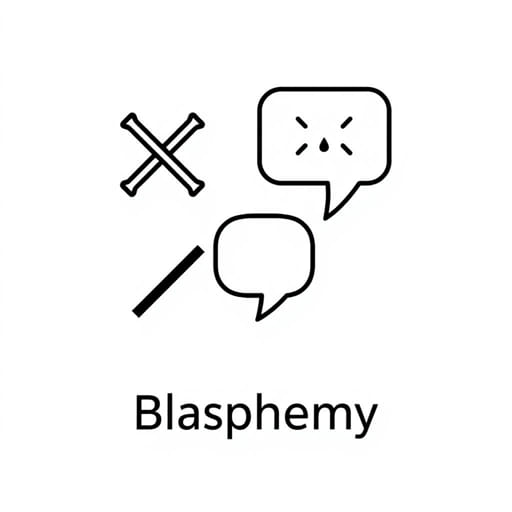Understanding how specific terms translate into other languages not only helps with communication but also allows us to understand cultural perspectives more deeply. One such term is blasphemy, a concept that often carries strong religious or moral implications. In Tagalog, which is the basis of the Filipino national language, translating the word blasphemy involves not just a linguistic equivalent but also an appreciation of how the idea is perceived in Philippine culture, especially considering the country’s predominantly Christian population. This topic explores the meaning of blasphemy in Tagalog, how it’s used, and how it reflects the values of Filipino society.
Meaning of Blasphemy
Blasphemy refers to any speech, act, or expression that shows disrespect or irreverence toward religious beliefs, sacred figures, or divine entities. It can involve insulting a deity, desecrating a sacred place, or ridiculing a religion. In many countries, blasphemy is taken seriously and may be punished either legally or socially. The level of severity often depends on the religious sensitivities of the society.
Common English Definitions
- Irreverent behavior toward holy persons or sacred things.
- Profane talk about God or religion.
- The act of speaking sacrilegiously about something considered sacred.
What is Blasphemy in Tagalog?
The direct translation of blasphemy in Tagalog is‘paglapastangan.’This word comes from the root lapastangan, which means disrespectful or offensive, especially in a sacred or religious context. Paglapastangan refers to the act itself. You may also see the term kalapastanganan used, which is a more formal or literary form and also means sacrilege or irreverence.
Tagalog Translations and Variations
- Paglapastangan the act of committing blasphemy
- Kalapastanganan a noun form, often used in formal writing
- Lapastanganin verb form, meaning ‘to blaspheme’ or ‘to desecrate’
- Bastos sa Diyos informal phrase meaning ‘disrespectful to God’
Usage of the Word in Filipino Culture
In Filipino culture, which is heavily influenced by Catholicism, blasphemy is often associated with deep moral and social taboos. People may view jokes or casual remarks about God or saints as offensive, even if they are not intended to be blasphemous. Thus, the concept of paglapastangan is not just limited to formal religious discourse but extends into daily conversation and attitudes.
Examples of Usage
- Ang paglapastangan sa simbahan ay isang kasalanan.(Blasphemy in the church is a sin.)
- Huwag kang magsalita ng kalapastanganan laban sa Diyos.(Do not speak blasphemy against God.)
- Lapastanganin mo ang banal na aklat at ikaw ay itatakwil ng lipunan.(Blaspheme the holy book and society will reject you.)
Religious and Social Context
The Philippines is the only predominantly Christian nation in Asia, with more than 80% of the population identifying as Roman Catholic. Because of this strong religious foundation, blasphemy is considered not just a moral failure but a serious social offense. Religious festivals, churches, icons, and rituals are treated with reverence, and any perceived insult is often met with strong disapproval. In some communities, blasphemous behavior can lead to ostracism or social conflict.
Legal Perspective
Although the Philippine legal system does not have specific laws titled blasphemy, it does have provisions that protect religious sentiments under broader laws such as:
- topic 133 of the Revised Penal Code Penalizes acts that offend religious feelings, especially in places of worship or during religious ceremonies.
- Libel and slander laws May be applied if blasphemous remarks are seen as defamatory.
Blasphemy in Everyday Life
While formal charges may be rare, accusations of blasphemy in everyday life still carry weight. A person who criticizes religious teachings or makes jokes about sacred figures may face backlash on social media or in their community. Public figures and influencers are especially cautious, knowing that comments perceived as paglapastangan can affect their reputation or careers.
Examples in Popular Culture
Occasionally, movies, songs, or artworks spark controversy for allegedly containing blasphemous content. In many cases, these debates reflect the tension between freedom of expression and deep religious devotion in the country. Religious groups may call for bans or boycotts if they feel a work of art shows kalapastanganan toward their faith.
Comparing Blasphemy in English and Tagalog
In English-speaking countries, the word blasphemy may have a more secular tone and is often discussed in philosophical or legal terms. In Tagalog, however, the term paglapastangan feels more emotionally charged and is often tied closely to faith and moral values. This difference reflects how Filipinos often integrate religion deeply into everyday life and community expectations.
Cultural Sensitivity
- In English: Blasphemy may be debated in academic or legal contexts.
- In Tagalog: Paglapastangan is often discussed in emotional or moral contexts.
- In Filipino society: Actions that are technically not blasphemous may still be perceived as offensive.
How to Avoid Blasphemy in Filipino Settings
If you are learning Tagalog or engaging with Filipino communities, it helps to understand and respect local religious practices. Avoid making jokes about God, saints, or churches, and refrain from comparing religious beliefs in a derogatory manner. Being mindful of how paglapastangan is perceived will help you build respectful and positive relationships.
Tips for Cultural Respect
- Speak respectfully about religion in public and private conversations.
- Avoid using sacred names in casual or joking ways.
- Be aware of local religious events or holidays.
- Understand that even non-religious Filipinos may still value respectful speech.
The translation of blasphemy in Tagalog as paglapastangan reveals more than just a linguistic connection it opens a window into Filipino cultural and religious values. In a society where faith plays a central role, the concept of blasphemy is treated with seriousness and emotional weight. Whether you are studying Tagalog or simply wish to understand Filipino culture better, recognizing the depth of meaning behind paglapastangan will help you navigate conversations with greater awareness and respect.
